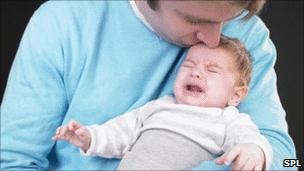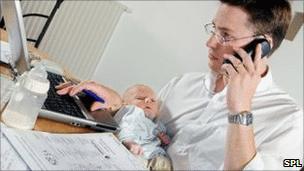Why fathers have post-natal depression
- Published

Men can feel the stress and responsibility of fatherhood weighing heavily on their shoulders
A Gloucester man has been acquitted of murdering his six-month-old daughter, after saying he had had post-natal depression. The case of Mark Bruton-Young has put the issue of men who struggle to cope with becoming fathers in the headlines.
One out of every seven new mothers has post-natal depression - but, according to the Fatherhood Institute, one out of every 10 fathers are depressed both before and after their baby is born.
The peak time for fathers' depression is thought to be between three and six months after the birth.
Like women, they can struggle with the huge life changes a baby brings, says Fatherhood Institute research head Adrienne Burgess.
"Hormones, lack of sleep, increased responsibility and general life stresses can apply to men just as much to women," she said.
"And if their partner is depressed, then men are more likely to be too."
Men and women who have pre-existing mental health problems are more at risk of developing depression after the birth of a child.
But a father's depression can begin during pregnancy, when relationships are already changing. Fathers can feel left out while their partner is the focus of increased attention.
Association for Post-natal Illness counsellor Liz Wise says: "Women can feel they do things best, like changing a nappy or feeding.
"They can be quick to criticise their partners and take over.
"They don't think about how it could undermine a man's confidence.
"In the end their partner will stop offering to help and that could lead to a breakdown of communication and then resentment."
It has also been suggested fatherhood is not recognised as a life-changing event, the way motherhood is.
Ms Burgess finds it shocking that fathers are not invited to ante-natal appointments.
"When the pregnancy is confirmed, the GP should invite the mother and father to come in.
"We need a directive that says you should ask about the women's partner too.
"That way they can pick up if he has any issues.
"Then they're more likely to be able to assess the more vulnerable men."

Fathers can struggle with the changes a baby brings
Both mothers and fathers can feel tired, stressed, emotional, inadequate and guilty as a result of being depressed - but they react to those feelings in different ways, which can make picking up the signs more difficult.
It is said that men with depression get mad, while women get sad.
Drinking too much, self-medicating and having affairs can all be signs of fathers with depression, say experts.
"Men are probably better at bullying the world around them when they are not happy, whereas women tend to internalise more," says Phillip Hodson, fellow of the British Association for Counselling and Psychotherapy.
Research also indicates children are at increased risk of emotional and behavioural problems in families where fathers are depressed soon after the birth, the impact can be traced up to the age of 11, and boys are more affected than girls.
"If you're really seriously, clinically depressed you care about nothing," says Mr Hodson.
"Depression is the worst pain imaginable and it's almost inevitable that someone else has to get involved to get you out of it."
The key is to access that support at the earliest available opportunity.
Counselling, psychotherapy, cranial osteopathy, massage and reflexology are all seen as potentially therapeutic, as well as resting, eating properly and writing down feelings in a journal.
Ms Wise says men should be treated in the same way as women.
"We tell them it's not uncommon, it's nothing to be ashamed of and we give them as much information as we can.
"Sometimes just acknowledging it works, and counselling and talking about it helps too."
Parenting charity the National Childbirth Trust has produced a leaflet for fathers, called Becoming a Parent.
It says: "Remember dads can also suffer from the depression, brought on by anxiety about their new circumstances.
"Don't bottle it up. Speak to your partner and your family and friends. Find out if there are dads' groups locally that you could meet with."
- Published9 May 2011